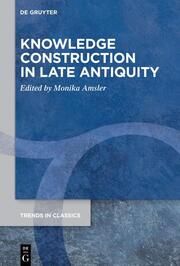Knowledge Construction in Late Antiquity
Lieferzeit: Vorbestellbar
Erscheint am: 10.08.2022
Social Studies of the sciences have long analyzed and exposed the constructed nature of knowledge. Pioneering studies of knowledge production in laboratories (e.g., Latour/Woolgar 1979; Knorr-Cetina 1981) have identified factors that affect processes that lead to the generation of scientific data and their subsequent interpretation, such as money, training and curriculum, location and infrastructure, biography-based knowledge and talent, and chance. More recent theories of knowledge construction have further identified different forms of knowledge, such as tacit, intuitive, explicit, personal, and social knowledge. These theoretical frameworks and critical terms can help reveal and clarify the processes that led to ancient data gathering, information and knowledge production. The contributors use late-antique hermeneutical associations as means to explore intuitive or even tacit knowledge; they appreciate mistakes as a platform to study the value of personal knowledge and its premises; they think about rows and tables, letter exchanges, and schools as platforms of distributed cognition; they consider walls as venues for social knowledge production; and rethink the value of social knowledge in scholarly genealogies-then and now.
Monika Amsler, University of Bern, Bern, Switzerland.
| Autor | Monika Amsler |
|---|---|
| Verlag | De Gruyter GmbH |
| ISBN | 9783110997637 |
| ISBN/EAN | 9783110997637 |
| Lieferzeit | Vorbestellbar |
| Erscheinungsdatum | 10.08.2022 |
| Lieferbarkeitsdatum | 26.04.2023 |
| Einband | Gebunden |
| Seitenzahl | X, 306 S., 5 s/w Illustr., 12 farbige Illustr., 3 s/w Tab., 5 b/w and 12 col. ill., 3 b/w tbl. |
Weitere Informationen
| Verlag | De Gruyter GmbH |
|---|---|
| ISBN | 9783110997637 |
| Erscheinungsdatum | 10.08.2022 |
| Einband | Gebunden |
Social Studies of the sciences have long analyzed and exposed the constructed nature of knowledge. Pioneering studies of knowledge production in laboratories (e.g., Latour/Woolgar 1979; Knorr-Cetina 1981) have identified factors that affect processes that lead to the generation of scientific data and their subsequent interpretation, such as money, training and curriculum, location and infrastructure, biography-based knowledge and talent, and chance. More recent theories of knowledge construction have further identified different forms of knowledge, such as tacit, intuitive, explicit, personal, and social knowledge. These theoretical frameworks and critical terms can help reveal and clarify the processes that led to ancient data gathering, information and knowledge production. The contributors use late-antique hermeneutical associations as means to explore intuitive or even tacit knowledge; they appreciate mistakes as a platform to study the value of personal knowledge and its premises; they think about rows and tables, letter exchanges, and schools as platforms of distributed cognition; they consider walls as venues for social knowledge production; and rethink the value of social knowledge in scholarly genealogies-then and now.
Monika Amsler, University of Bern, Bern, Switzerland.
Kategorie

